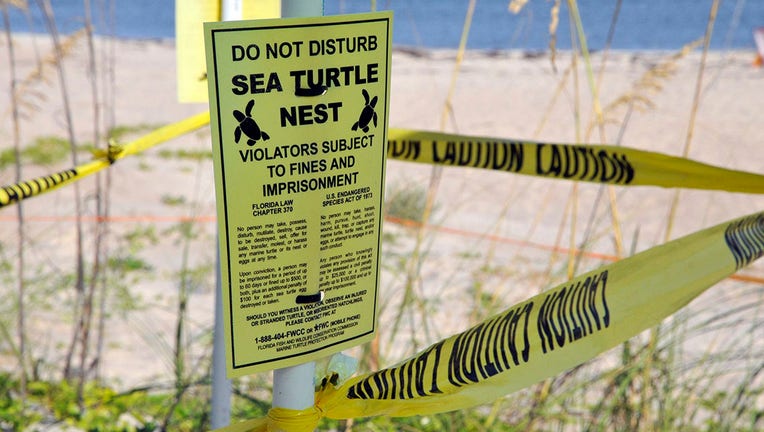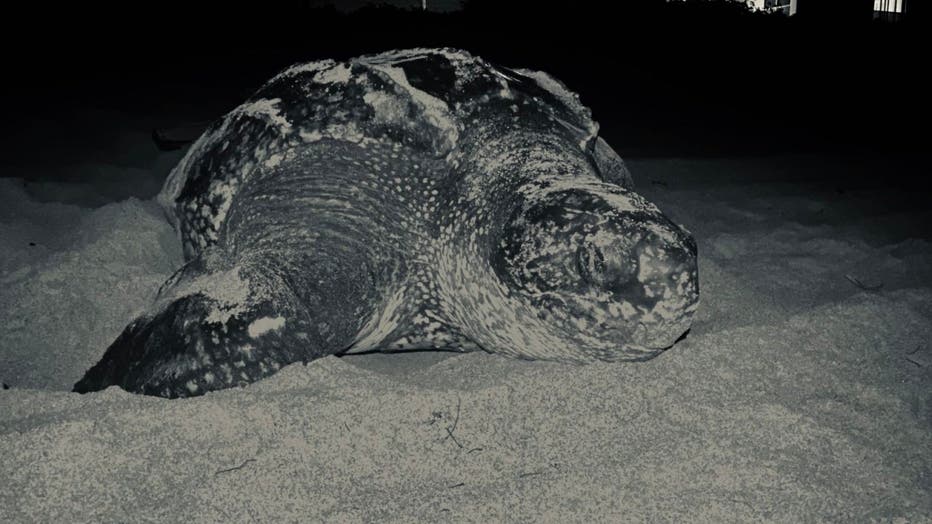Vulnerable sea turtles flourishing in Florida during coronavirus restrictions

(Courtesy: FWC)
JUNO BEACH, Fla. - Vulnerable leatherback sea turtles are flourishing on a South Florida beach amid the coronavirus lockdown.
In an April 18 Facebook post, the Loggerhead Marinelife Center said that its staff had discovered 79 leatherback and loggerhead turtle nests on a 9.5-mile stretch of beach that encompasses Juno Beach. Some 76 of the nests were leatherback turtle nests and three were loggerhead nests, it said. Staff documented the first leatherback nest at the start of February, according to a blog post on April 17.
Around the same time last year, the staff had discovered just 41 nests.
Related: Jellyfish glides through clear waters of Venice canal
The area is one of the most densely nested sea turtle beaches in the world, according to the Loggerhead Marinelife Center.
"We’re excited to see our turtles thrive in this environment," Sarah Hirsch, senior manager of research and data at Loggerhead Marinelife Center told CBS 12.

A nesting leatherback turtle dubbed “Aussie” laid her nest on Juno Beach in Florida on April 1, 2020, according to the Loggerhead Marinelife Center. (Loggerhead Marinelife Center)
Leatherback turtles are listed as vulnerable on the International Union for Conservation of Nature’s Red List. Tourism and recreation areas are among the threats to the turtles, according to the IUCN. However, the World Wildlife Fund notes that many subpopulations of leatherback turtles, such as in the Pacific and Southwest Atlantic, are critically endangered.
For sea turtles across the globe, humans have made it difficult to nest on sandy beaches. The turtles need to be undisturbed and emerging hatchlings get confused by beachfront lights, says David Godfrey, executive director of the Sea Turtle Conservancy.
Related: As people stay home, Earth turns wilder and cleaner
But with lights and people away, this year’s sea turtle nesting so far seems much better from India to Costa Rica to Florida, Godfrey says.
“There’s some silver lining for wildlife in what otherwise is a fairly catastrophic time for humans,” he says.
If you feel sick:
The Florida Department of Health has opened a COVID-19 Call Center at 1-866-779-6121. Agents will answer questions around the clock. Questions may also be emailed to covid-19@flhealth.gov. Email responses will be sent during call center hours.
LINK: Florida's COVID-19 website
CORONAVIRUS IN FLORIDA: What you need to know
AROUND THE WORLD: CoronavirusNOW.com
Map of known COVID-19 cases:
MOBILE APP USERS: Click here for map
The Associated Press contributed to this report.

